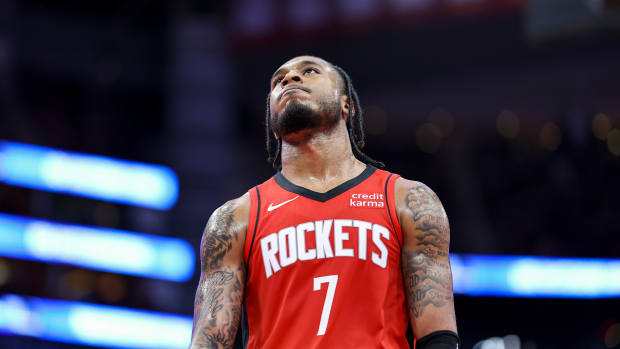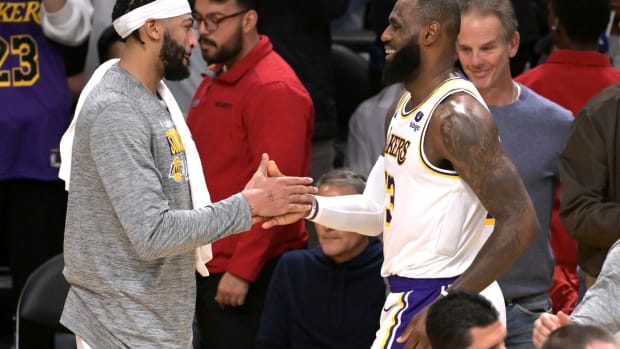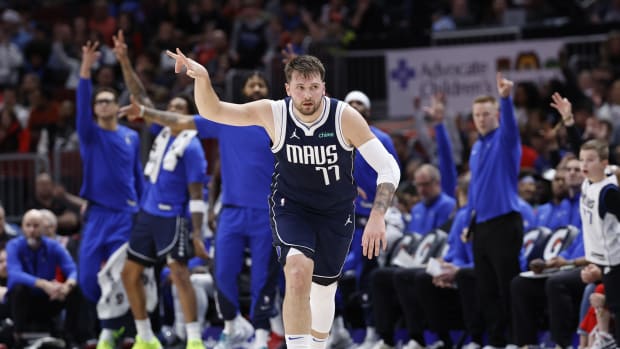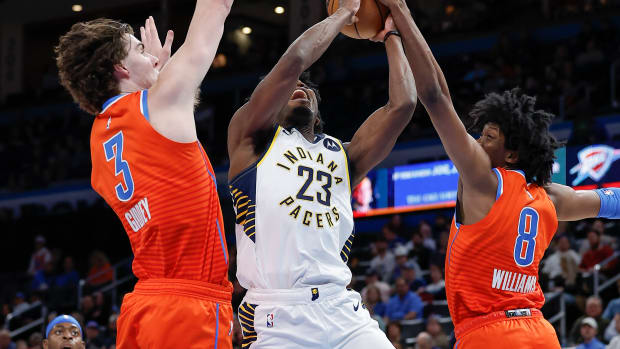Prized Pupil: Kyle Kuzma Is Out to Prove the Doubters Wrong
This story appears in the Feb. 25, 2019, issue of Sports Illustrated. For more great storytelling and in-depth analysis, subscribe to the magazine—and get up to 94% off the cover price. Click here for more.
On the Sunday that Kyle Kuzma found out he was—maybe, possibly—going to be traded, he chose to view the news as a good sign. This was back at 3 p.m. on Jan. 27. Kuzma was driving his black Porsche Panamera down I-10 toward Staples Center. In three hours the Lakers were scheduled to play the Suns, and Kuzma was officially a game-time decision because of a balky left hip. Prepared for the worst, he had picked out a suitable bench ensemble: skinny gray pants, black blazer, reversible purple pocket square and open-necked shirt, the better to highlight the ink on his chest.
The outfit, like Kuzma, was hard to miss. Ebullient, self-assured and tall, he can seem, as L.A. assistant Miles Simon says, “like he was born to be a Laker.” Kuzma’s game is a beguiling meld of old and new school. He swoops and flips and attacks, deploying hooks and half-hooks and floaters, like some Kareem-Worthy-Bryant mash-up. He’s equally capable of posting up and draining threes and has proved a particularly good fit next to LeBron James, which is no mean feat.
It helps that, though only 23 and never a heralded prospect, Kuzma possesses an abiding conviction that every shot he takes is destined to go in. Miss nine in a row and Kuz is all about getting up number 10. Teammates marvel at his confidence. “Second to none,” says point guard Lonzo Ball. Similarly wired humans recognize the trait. “He’s got it,” says Suns guard Jamal Crawford. “That’s a gift, man.” Says Kobe Bryant, who could go 0-for-January and start February with an iso clear-out, “He understands it’s not about whether you missed or made the last one but about being in the moment.”
Now, only a year and a half into his career, Kuzma found himself in an enviable situation: the Porsche, the All-Star-ish numbers (19.1 points and 5.6 rebounds per game), the fashion features in GQ, the fans bedecked in kuzmania shirts, the historic trifecta of sorts. How many late-first-round picks—Kuzma went 27th in 2017—can count Bryant as a mentor, James as a teammate and Magic Johnson as a boss? “I’m tripping out every day,” Kuzma said as he took the route that allowed him to best take in the looming glory of Staples. “Where I came from to where I am now? It’s like a damn movie.”
So, no, a few trade whispers didn’t bother him, at least not at this early stage. It wouldn’t be until the next morning that Anthony Davis announced his intention to leave New Orleans, preferably for the Lakers, triggering what amounted to a 10-day, slow-motion franchise car crash, the wreckage of which is still being sorted. For the time being, though, Kuzma’s name was only being mentioned as a potential piece, unattached to any specific deals. As he had his entire life, Kuzma embraced an optimistic perspective.“They always say that if you’re in trade talks, that’s probably a good thing,” he said. “It means somebody wants you.”
Karri Kuzma can’t recall when she realized that her first born son, as she says, “ticked different.”
Perhaps it was when he was five and declared he would play in the NBA. Or when, in fifth grade, he vowed to make the school choir, despite possessing what his younger brother, Andre, describes as “really, a terrible singing voice.” (Kyle made it). Or maybe it was even earlier, back when Karri’s mom dubbed the fearless toddler King Kyle, the type of boy who’d head straight for the deep end even if he couldn’t swim.
Regardless, Karri appreciated it. She’d grown up in Otisville, Mich., a speck of a town northeast of Flint. Raising three kids, largely by herself, the former center at Hillsdale (Mich.) College at one point worked two jobs while studying online toward her degree in business administration. Kyle and his brother remember hearing the pop of gunfire outside and the rashes that came from the polluted water. It seemed like nothing good ever happened in Flint. Still, Karri drilled her beliefs into the kids. There’s no job you can’t learn. There’s nothing you can’t achieve if you want it.
Early on, she empowered Kyle. He took the bus by himself to the Flint YMCA during middle school summers, balling with the old heads at noon and the teens later on, napping on the squishy blue mats in between. Shelly McArthur, the director of the Y, recalls a “polite and charming” boy who “you couldn’t really turn away,” even if his membership lapsed at times. “He’d come up and sit up at the front desk and just chitchat with us, these two 40-year-old women,” she says. Kuzma came in with a group that included Monte Morris (who would go on to play for the Nuggets) and Miles Bridges (a rookie this year with the Hornets). They called themselves the Flintstones.
Kyle’s NBA progress trailed his aspirations. His seventh grade coach cut him. He entered high school as a 5'8" point guard. Invitations to elite camps and top AAU teams never materialized. Finally, as a gangly junior playing for a Class C school—his third in three years as Karri moved for new jobs—he took matters into his own hands. Using a propped-up phone, he filmed himself at the Y, throwing the ball off the wall to himself and shooting jumpers, then sent the “clips” to prep schools across the country. Vin Sparacio, the coach at Rise Academy in Philadelphia, figured, Why not? By then Kuzma had grown to 6'5". So, weeks before his senior year, Kyle told his mom he was headed to Philly. She was shocked—“he orchestrated the whole thing himself”—but now realizes it was for the best. They spent the night before he left hugging and crying.
After a rocky beginning—“I couldn’t stand him at first,” says Sparacio—Kuzma found his groove at Rise, averaging 22 points and eventually catching the eye of University of Utah assistant DeMarlo Slocum.
Utah brought challenges. Like, for example, playing defense. The staff laid into him. Often, Kuzma ended up on the couch in Slocum’s office, bewildered, tears in his eyes. He thought about transferring. Then, as a sophomore, he beat out a top 70 recruit for the starting power forward job. “It was mentality alone,” says Slocum. “Kyle just worked a little harder and had a little more want and drive to him.” Then the Utes’ assistant says something you hear frequently when talking to people about Kuzma: “You could never tell Kyle there was someone better than him.”
It’s a business. What matters is being professional. That’s what the vets always pound into the young players. So in the days after Davis’s declaration, Kuzma and his teammates tried to act the part. They talked about controlling what you can control. At practice that Monday after the news broke, a reporter asked forward Brandon Ingram what he thought about possibly being dealt for AD. Ingram paused, then offered, “That would be good for the Lakers. . . ?”
It was no doubt a weird position for Kuzma & Co. One moment you’re part of the celebrated young core of an iconic franchise. The next you’re offered up with anything else the Lakers can think of short of the 11 championship trophies in the practice center. (The reported final L.A. offer included Ball, Ingram, Kuzma, guard Josh Hart, center Ivica Zubac, guard Kentavious Caldwell-Pope and two first-round draft picks.)
At least from the outside, it seemed this was largely LeBron’s prerogative. James is 34, and despite his preseason talk of building slowly in L.A., both his patience and title window dwindle. His agent, Rich Paul, is Davis’s agent. The dots don’t need to be connected; they’re practically the same dot. The low point came during a 42-point loss to the Pacers, when Indiana fans serenaded Ingram as he stood at the free throw line: “LeBron’s gonna trade you! LeBron’s gonna trade you!”
Kuzma felt frustrated. Powerless. He tried to focus on the game. It had always been his escape.
Lakers coach Luke Walton knew next to nothing about Kuzma when GM Rob Pelinka handed him a list of players the team was targeting with its second pick in 2017. After watching tape from Utah, Walton was flummoxed. “He had these flashes in the game where you were like, ‘Holy lord, this kid is special,’ ” Walton says. “And then you’d watch another 15 minutes of the game, and you’d forget he was on the court.”
After a strong but not spectacular junior year, Kuzma had declared for the draft against the advice of, well, pretty much everyone. Experts slotted him in the late second round—if he was drafted at all. But Kuzma had finished his studies in communications and, as he says, “Isn’t the main point of college to get a degree and start your life?”
A strong combine led to an invitation to a group workout from the Lakers. “He won every drill and dominated,” says Walton. They acquired him from the Nets on draft night. Expected by most to be overshadowed by Ball, the No. 2 pick, Kuzma went on to win summer league championship MVP, immediately clicking with Ball. Recalls Walton, “He figured out before anyone else that when that shot goes up, if you leak out—which we don’t encourage, but it was Summer League—Lonzo was going to throw it over the top. So he was getting like eight points a game on literally just leaking out. I was like, O.K., he’s already got a scorer’s mentality.” It was about this point that Walton stopped caring about those parts of the tape where Kuzma had disappeared.
Walton is big on empowerment, promoting player involvement through what he calls “active learning.” For Kuzma, Walton’s approach acted like a force magnifier. “I love Luke,” says Kuzma. “Ever since I came in the league, he’s let me be myself. It’s one thing to be confident, but when your head coach believes in you and he’s confident, that takes your confidence way up.” Perhaps this is what inspired Kuzma, early in his rookie season, to reach out to Bryant. “Cold-called me,” says Kobe. “I liked his curiosity.” Bryant invited Kuzma for a steak dinner. Kuzma was giddy.
A friendship began. Kobe being Kobe, his advice often came in basketball koans. For example: To be unstoppable you must first be predictable. Explains Bryant, “So teams say, ‘O.K., I know Kyle likes to do this.’ All right, that’s great, that’s awesome. Now stop it.” Bryant continues. “Now a team makes you do something else, and you have a counter to that predictable move, and when they cut off that counter, you have a counter to that counter. But first you have to be predictable, because it not only gets you a sense of stability, night in and night out, but it also gets your teammates a sense of stability. Familiarity is extremely important.”
Kuzma soaked it up, leaning on Bryant to develop the mental part of the game. Then, around February of his rookie year, Kuzma decided, 'Why not reach out to LeBron too?' That James played for the Cavaliers at the time, and didn’t know Kuzma, provided little impediment. After getting James’s number from mutual friends, Kuzma mulled how to begin his text. Finally, as he recalls, he settled on: Hey, this is Kuz.
Within minutes, James hit him back. Granted an audience, Kuzma began picking James’s brain too: How did he take care of his body? How did he avoid the rookie wall?
When James responded, Kuzma couldn’t help but be a bit disappointed. “He said, ‘Whatever you do, just make sure you do it consistently, because that’s greatness,’ ” Kuzma recalls. “At the time, I didn’t really understand. It sounded cliché. Like, of course. I know you do some s--- for your body, but what?” Kuzma continues. “But being his teammate now, I see it. He does the same thing every day. He comes to the gym, lifts every day, gets ice, gets a massage, gets treatment after practice. That’s consistency.”
Five months later, James signed with the Lakers and they were teammates. Kuzma immediately FaceTimed James, catching him before he left for a European vacation. Best Kuzma can recall, the gist of his message was, “Let’s do this!”
Things were about to get big time in L.A. Flint seemed a lifetime ago.
Shelly McArthur was accustomed to people moving on. She couldn’t entirely blame them. She figured the same would occur with Kyle.
Sure, once, when he was in high school, Karri had come in to thank McArthur for helping her son. When he makes the NBA, he’s going to remember you guys, Karri told McArthur.
McArthur remembers being touched—she’s a big fan of Karri because, “unlike a lot of kids in this area, she was a mom who always supported his dream”—but she was also skeptical. “People don’t come back,” explains McArthur. “We’re a community that’s taken so many hits.”
So it took her by surprise when, within days of signing his first pro contract, Kuzma reached out to the Flint Y: “I’d really like to do something.”
“It was all him, we never called,” McArthur says. “The minute he made the NBA, he started giving back.” She lists equipment—hoops, weights, fitness gear, backpacks, life jackets. She talks about the Christmas party he sponsored, the surprise visit before a summer camp he held, which the Y turned into a national promotion. “Around here,” McArthur says, “to see a kid succeed at that level is just huge.”
Around the same time, Kyle moved Karri into a nice condo in Grand Blanc, a suburb of Flint, and Andre moved in with her. Karri felt like she was living in two worlds. She got requests. “Do you think he’d take me to the prom?” “Can I meet him?” And this was before James joined him in L.A. She could only imagine what was coming.
The first preseason game drew 19,000. Shootarounds played to throngs of hundreds. Media hovered everywhere.
Kuzma felt ready. He’d spent the summer gaining strength and working on his shooting, mimicking Klay Thompson’s form. Still, he struggled at first to find his way alongside James. Seeing this, Johnson, the Lakers’ president, pulled him aside one afternoon. The two shared a bond. Both grew up in Michigan. Both can charm on impact. Both approach the game with palpable joy. Now Magic reminded Kuzma of that last trait. “He said, ‘You’re treating this as a business, you’re not having fun,’ ” Kuzma recalls. “ ‘Last year, you always had a smile on your face. That’s what I want to see.’ It helped.”
Meanwhile, James counseled him on how to be ready when the defense sat on one of his moves. New Lakers point guard Rajon Rondo taught him how to watch film the right way: Examine every play, not just your own; focus on defense more than offense. Kuzma began a habit, after every game, of going home and immediately rewatching the game. Often, he texted Walton, knowing the coach was likely also awake. “He’ll send me clips at like 3 a.m.,” says Walton. “And the questions he’s asking are real. He’s not sending me a clip of him doing something good and saying, ‘Hey, should I have done something different on this?’ ”
This is a theme with Kuzma. “He’s different from most young players,” says Simon. “You can coach him hard. Like really hard.” Kuzma’s progress has been most obvious on defense. “Last year he was one of the worst defensive players we had,” says Walton. He’s since reduced his “happy feet,” as Simon puts it, using his size to influence quicker players and worrying less about anticipating their moves. As a result, the Lakers have tasked him with both posts and wings this year, including what Walton calls “some f------ big-time matchups,” citing Thompson and Karl-Anthony Towns.
Kuzma aims high. He talks about attaining “Mount Rushmore” status. He says, “I know I’m going to be great wherever I’m at because I love the game.” In another player, this could be off-putting, but with Kuzma it doesn’t come across as bravado because, as Ball puts it, “He doesn’t have an ego.” (Of course, this doesn’t make Kuzma deferential. As Ball said during their rookie year, “He be calling plays for his self a lot. I just don’t be running them.”)
Meanwhile, Kobe advised Kuzma to be himself. “A lot of players concern themselves with things that aren’t important,” he says. “The shot they just missed before and potentially missing the next one and then what people may say about them because of it. The true art of any athlete is just to be in the moment.”
Bryant is talking about basketball, though.
The Thursday of trade deadline arrived. By this point, a deal seemed unlikely. Kuzma watched the clock, anxious. Finally, at 3 p.m. EST it was official. He was still a Laker. At least for a few months. Now came the awkward part: trying to rebuild team chemistry and trust.
When Kuzma and I talk again, two days after the deadline, his usual enthusiasm is muted. “It was hard,” he says. “You can’t really escape these things. You can’t look at your phone without someone sending you a text. You can’t go on social media. . . . I felt like the whole team got very tense.” Communication was minimal, he says, including from James. Games were the toughest. “Everyone’s screaming at you, and people forget we’re humans too, that everybody has emotions. . . . Fans think we’re just part of a circus, here just to entertain them. I get it, I go on social media and laugh too but sometimes people forget the people they’re laughing at are humans.”
The next day, the Lakers played at Philadelphia. Magic flew out to, as he told reporters, “hug ’em and tell them we got to come together.” Perhaps he’d restore the joy. If he did, it wasn’t apparent. “Quit making this about thinking these guys are babies, because that’s what you’re treating them like,” Johnson told the media that morning. “They’re professionals. All of them. And this is how this league works. They know it, I know it.” The Lakers lost, despite 39 from Kuzma.
The week that followed offered little clarity. James had returned to the lineup after missing 17 games with a groin strain, but the team struggled, falling under .500 and into 10th place in the Western Conference. Would the Lakers rally for a playoff run? Throw in the towel? Fire Walton? It’s anyone’s guess what they will look like in six months. Kuzma could be a face of the franchise for the next decade or he could be getting buckets somewhere else. Friends aren’t too worried, though. “The reality is, he’s still living the dream,” says Slocum, adding, “Good luck telling that kid he can’t do something.”







































